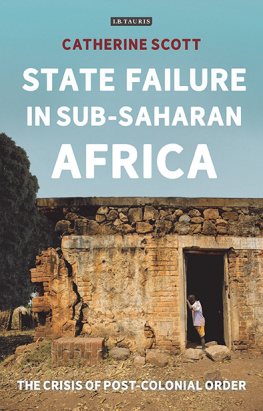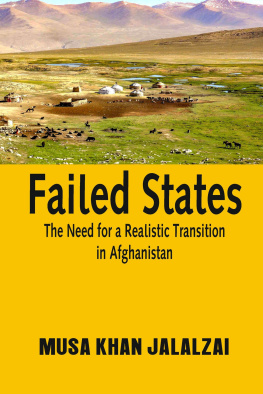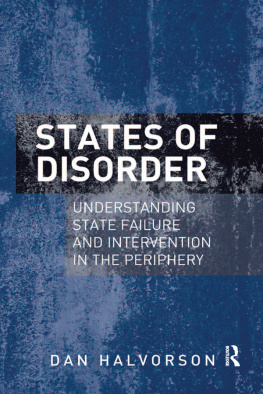State Failure, Underdevelopment,
and Foreign Intervention in Haiti
Routledge Studies in North American Politics
1. Political Institutions and Lesbian and Gay Rights in the United States and Canada
Miriam Smith
2. Black Women, Cultural Images and Social Policy
Julia S. Jordan-Zachery
3. How Courts Impact Federal Administrative Behavior
Robert J. Hume
4. State Failure, Underdevelopment, and Foreign Intervention in Haiti
Jean-Germain Gros
First published 2012
by Routledge
711 Third Avenue, New York, NY 10017
Simultaneously published in the UK
by Routledge
2 Park Square, Milton Park, Abingdon, Oxon OX14 4RN
Routledge is an imprint of the Taylor & Francis Group, an informa business
2012 Taylor & Francis
The right of Jean-Germain Gros to be identified as author of this work has been asserted in accordance with sections 77 and 78 of the Copyright, Designs and Patents Act 1988.
Printed and bound in the United States of America on acid-free paper by IBT Global.
All rights reserved. No part of this book may be reprinted or reproduced or utilised in any form or by any electronic, mechanical, or other means, now known or hereafter invented, including photocopying and recording, or in any information storage or retrieval system, without permission in writing from the publishers.
Trademark notice: Product or corporate names may be trademarks or registered trademarks, and are used only for identification and explanation without intent to infringe.
Library of Congress Cataloging in Publication Data
Gros, Jean-Germain, 1964
State failure, underdevelopment, and foreign intervention in Haiti / by Jean-Germain Gros.
p. cm. (Routledge studies in North American politics ; 4)
Includes bibliographical references and index.
1. HaitiPolitics and government. 2. Failed statesHaiti.
3. Economic assistanceHaiti. 4. Technical assistance Haiti. I. Title.
JL1090.G76 2011
972.94073dc23
2011018809
ISBN: 978-0-415-89032-8 (hbk)
ISBN: 978-0-203-18270-3 (ebk)
To Ayo and Eni
Foreword
I had been at the University of Ghana-Legon for only a few weeks as a visiting professor of political science and director of the Missouri-Africa program in 2004 when I met the dean of international of studies at a welcoming reception. This was an event of merrymaking, food, traditional African music, and choreography. But when I told the esteemed host I was a Haitian-American, his facial expression became decidedly grave, a far cry from the unabashed conviviality hitherto on display. I had seen the metamorphosis on other occasions. The deans was probably not unrelated to the fact that Haiti had just been hit by Hurricane Jeanne, which had killed over three thousand Haitians, and CNN was broadcasting worldwide the plight of desperate victims, ankle-deep in mud, trampling on each other for the most basic of lifes necessities: food and water. How is it, he asked, perhaps in the sympathy wrought by distant kinship, perhaps as a point of inquiry, that Haiti, the worlds first black republic, the second oldest independent country in the Americas, the land of Toussaint Louverture, had become such a development basket case, a seemingly unending cause clbre of the macabre?
The frequency with which I have been asked variants of this question in class, at colloquia, professional meetings, cocktail parties, and other venues has yet to soothe the metabolic reaction: the heart feels as though it is cascading into the deepest cavity of the stomach in search of the safest hiding place; the lips are parted to offer the kind of forced smile that nature may have long ago decided was a good artifice for anger, pain, and embarrassment; the mind triggers an irrepressible urge to jump to the defense of the homeland, even though it may not be under attack and an effective riposte is made impossible by the unassailability of the evidence.
Still, regardless of who is asking, there is good reason for any Haitian to be apprehensive about the question, for it is a loaded one, fraught with all sorts of implications. Its bifurcation suggests a cause-and-effect relationship between the past and the present that makes Haitians entirely responsible for their predicament, which is far from the whole truth. Haiti, that western third of the island of Hispaniola in the middle of the Caribbean, has been at the forefront of some of the most momentous developments in the modern age: genocide, transatlantic slavery, global capitalism, social revolution, poverty, foreign intervention, earthquakes, etc.
I have developed a standard two-part answer to the question, which is at the heart of this book. The glorious past of Haiti was not in fact so for most Haitians, who were forcibly plucked from their environment and thrown into the maelstrom of the most brutal form of slavery, and this abduction is partly responsible for Haitis terrible present. Hence Haiti must be understood in terms of continuity even in a historical context of rupture, and in this universe lots of actors and forces have played their role in the Haitian denouement. If I feel loquacious and the enquirer shows sustained interest, I often identify the most important actorthe Haitian stateand complement the soliloquy with a geography and demography lesson that also underscores the importance of technology. The whole thing may be synthesized thus.
As it is conventionally understood, the state has never existed in Haiti. Yet, the state is conditio sine qua non for the prosperity of nations. The root cause of Haitian poverty is, therefore, the absence of a working state. Haiti is also a country that is 80 percent mountains. All of its major cities are seaside agglomerations, which make them vulnerable to hurricanes, floods, and mudslides, not to mention the threat of foreign invasion. The population has grown from half a million to nearly 10 million in the past 215 years. Meanwhile, the technology of production, especially as it relates to agriculture, has barely changed since the demise of colonialism because the insecurity of property rights wrought, once again, by a dysfunctional state acts as a disincentive to innovation. Moreover, the inability of the Haitian state to insure against risks increases transaction costs, which have deleterious consequences on the efficiency of exchange and by extension the economy.
Broadly speaking, then, institutions are left, front, and center of the Haitian miasma, but the outcome of institution making, even a bounded one such as the state, is not determined by internal factors alone. To understand the Haitian failed state, imperialism must be brought back in, even while the failings of Haitis rulers and institutions also take center stage. Furthermore, because Haiti is part of a group of bottom billion countries wracked by wrenching poverty, dysfunctional states, incessant conflicts, population growth, environmental degradation, and foreign (i.e., UN-sanctioned) intervention, it hardly makes sense to examine the Haitian experience as an isolated case. Instead, the best way to study Haiti is from a comparative perspective through a method I call transbounded institutionalism.











